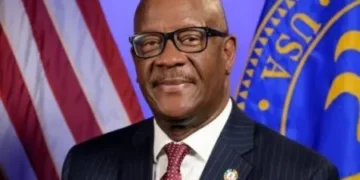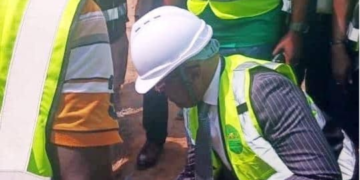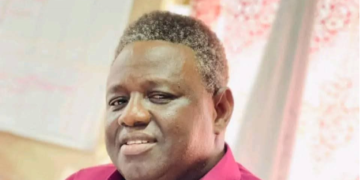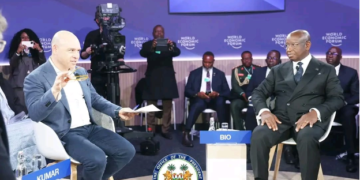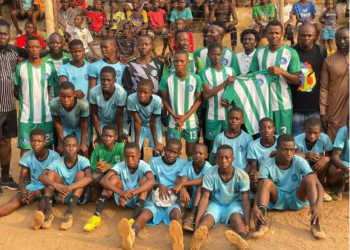By Albert Jerome Momoh.
Email: albertino79us@gmail.com
The SLPP-led government, under President Julius Maada Bio, has proposed a power-sharing arrangement with the main opposition party, A.P.C., following recommendations by a Tripartite Committee reviewing Sierra Leone’s disputed 2023 general elections.
This article argues that while intended to foster unity, such a proposal risks entrenching political divides and undermining long-term democratic growth, as shown through both its strengths and weaknesses, and in comparison to similar African arrangements.
In Sierra Leone’s 2023 general elections, the proportional representation system, also known as the PR system, was temporarily used for parliamentary elections. President Bio now calls for a dialogue about using this PR system beyond parliament.
He suggests applying it to the executive branch and the public sector. In his address at the opening of the Third Session of the Sixth Parliament of the Second Republic, President Bio said, “We must continually champion reforms that foster unity and inclusion. It is time to renew national dialogue on adopting proportional representation, not just for parliamentary elections, but across the executive and public sector.”
This proposal would divide cabinet positions between the SLPP and APC, based on the share of votes each party receives in an election. The APC party, in a press release dated October 2, 2025, strongly rejected this proposal.
The party called it a ploy by the SLPP to consolidate power and warned that it could return the country to one-party rule. The APC argues that Sierra Leone’s 1991 constitution calls for a First-Past-The-Post (FPTP) system. They say the PR system should only be used in national crises, such as during the 1996 general elections, when the country was in the midst of a civil war.
One-party rule was formally introduced in Sierra Leone on June 12, 1978, through a constitutional referendum. This made the A.P.C the sole legal party. This current discussion highlights Sierra Leone’s deep political tensions. Historically, the country has had a winner-takes-all political system and an ethno-regional divide. The SLPP’s support base is in the south and east. The APC’s support base is in the north and northwest.
Questions remain about whether a power-sharing arrangement will resolve deep-seated divisions or simply create new tensions. Is it feasible and will appointees in such an arrangement undermine the elected government’s mandate by maintaining loyalty to their parties? Appointment processes and true representation also raise concerns. Yet, given Sierra Leone’s history of political violence, the SLPP argues that such reforms are necessary for national cohesion.
As Sampson Kwarkye notes in a June 2025 report; ‘Despite a veneer of national cohesion, deep ethnic and political divisions persist in Sierra Leone. These were evident during the 2023 contested elections, which required a national unity agreement to defuse tensions between the government and the opposition All People’s Congress (APC)’.
Shifting focus to the broader African perspective, in African democracies—and especially in Sierra Leone’s context—power-sharing arrangements present a complex picture. Although they are viewed as tools to address alleged flawed elections, such arrangements can also lead to institutional dysfunction and hinder genuine democratic development.
When used to resolve contested elections, power sharing often fails to address the issues of democratic deficit. Even though advocates for this approach argue that it promotes peace and stability and ensures representation, it can also deepen tribal or regional divisions, particularly if some sectors of society feel they are not fully represented or are not receiving equitable distribution of national resources.
For instance, in Kenya, a power-sharing government was formed to end post-election violence from 2008 to 2013. While this arrangement helped calm tensions and enabled the adoption of a new constitution, it did not prevent infighting, and the power-sharing model ultimately failed to tackle corruption.
Similarly, the Zimbabwe unity government of 2009 to 2013 was widely considered a failure, as the ruling party retained control of the security sector and blocked reform efforts.
Another example is Burundi, where power sharing helped end the long-running civil war. However, this arrangement did not prevent democratic backsliding.
A key issue for Sierra Leone is whether power-sharing arrangements foster true democracy or merely mask deep-seated divides. While power sharing has historical precedent, some analysts argue it rewards opposition violence rather than fostering reform.
The incomplete implementation of the Truth and Reconciliation Report recommendations has allowed persistent ethno-regionalism in elections. This article contends that power sharing is not a solution to Sierra Leone’s complex challenges. Robust electoral reform, legal amendments, private sector support, and competitive democracy are required. Lasting democracy depends on effective opposition and fair competition, not on temporary power-sharing agreements.



